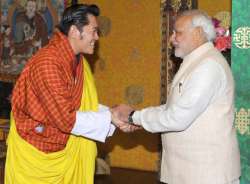Bhutan cited ‘vitiated atmosphere’, India's interests to pull out of SAARC meet in Islamabad
Bhutan had pulled out of the SAARC Summit, scheduled next month in Islamabad, in support for India’s national interest and is understood to have cited the vitiated atmosphere in the wake of the Uri terror attack behind its decision.

Bhutan had pulled out of the SAARC Summit, scheduled next month in Islamabad, in support for India’s national interest and is understood to have cited the “vitiated” atmosphere in the wake of the Uri terror attack behind its decision.
Expressing solidarity with India, Bhutan is said to have conveyed to Nepal, the SAARC Chair, that the “atmosphere had been vitiated and it was no longer conducive to hold the SAARC Summit under the present situation.”
Bhutan, along with Bangladesh, Afghanistan and Sri Lanka had pulled out of the next month’s regional meet after India said it would not attend the event as the “environment was not conducive”.
“We also share concerns of Bangladesh, India, Afghanistan about deteriorating peace. We have also conveyed that as far as India’s national interest is concerned, we are very clear that we will support India where its national interest lies,” Thimpu is believed to have conveyed to Nepal.
In 2003, Bhutan had destroyed military camps of ULFA, Kamtapur Liberation Organisation (KLO) and National Democratic Front of Bodoland (NDFB), all detrimental to Indian security concerns.
The Himalayan nation had said that terrorism emanating from Pakistan was a matter of concern for South Asia and affected peace and stability in Bhutan as well, the sources said.
The SAARC Summit, scheduled to be held in Islamabad in November, had to be postponed after five member states of the grouping, including India, Bangladesh and Bhutan, decided against attending the meet following the terrorist attack on an Indian army camp in Uri in Jammu and Kashmir in which 19 soldiers were killed.
The sources said Bhutanese outposts on the China-Bhutan border often witness “seasonal incursions” from the Chinese side even though the ‘Himalayan Kingdom’ supports ‘One-China Policy’. The autonomy for Tibet is “more of a sentimental issue than realistic”, they said.
The Bhutanese embassy in New Delhi registers protests following such incursions. Bhutan is one of the countries with which China still has territorial dispute.
On the Bangladesh, Bhutan, India and Nepal Motor Vehicle Agreement, the sources said that the Bhutanese government is working to get it ratified by its Parliament.
Although the Lower House of the Bhutanese Parliament has given its nod to ratify the agreement for regulation of passenger, personal and cargo vehicular traffic, various concerns have been raised by the Upper House.
The sources said the Bhutanese government is trying to address the concerns raised by the Upper House so that the agreement could be ratified at the earliest.
(With PTI inputs)